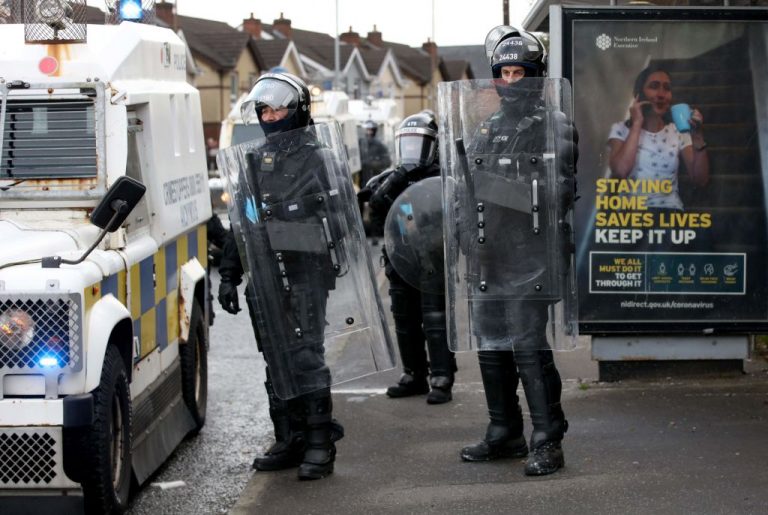The Government of Ireland recently conducted a secret wargame preparing for the installation of lockdowns and fuel control in the event the country runs either an oil deficit or faces a total electricity shortage starting as early as September, reporting shows.
In an exclusive article published June 6 by the Irish Independent, the outlet says it obtained “confidential details of an emergency planning exercise held 10 days ago between all the major state agencies and the Government.”
The article states the exercise was coined Oil Emergency Exercise and conducted on May 26 by the Department of the Environment, Climate and Communications (DECC) where members from the DECC, in addition to the following agencies, participated:
- National Oil Reserves Agency (NORA)
- Fuels for Ireland (FFI)
- Department of Transport and National Emergency Coordination Group (NECG)
Work from home, no driving
The wargame contained a multitude of “emergency contingency measures,” specifically,
- “Non-essential workers” will be ordered to work from home
- “Non-essential” car travel will be limited
- Fuel rationing for motorists will be strictly enforced
- An “immediate and strict reduction” in the speed limit will be imposed.
Restrictions on freedom of movement and fuel purchases were explained in the article, “The plan also includes the introduction of an emergency scheme whereby motorists with an odd number at the end of their car registration will only be allowed to drive or refuel on alternate days.”
Success
You are now signed up for our newsletter
Success
Check your email to complete sign up
For example, “Those with odd numbers could refuel on a Monday, Wednesday and Friday and those with an even number on a Tuesday, Thursday and Saturday.”
No oil = no electricity
An unnamed “Government source” told the Independent that three mock scenarios were run during the exercise:
- A 20 percent reduction in diesel volumes entering Ireland starting Sept. 1;
- A 30 to 35 percent reduction in diesel volumes entering Ireland over the previous eight weeks starting Dec. 19; and
- Not enough oil and gas to supply electricity in February of 2023.
The source was paraphrased as describing “the planning exercise and the options available to mitigate supply problems and protect societal function as ‘very, very stark’.”
In the first scenario, the exercise anticipated “diesel stockouts” where “many fuel stations will run dry and supply to critical and emergency services will be threatened.”
LOCKDOWNS, SOCIAL CREDIT, FOOD CRISIS
- Iranian Government Moving To Digital Bread Rationing
- Gas Prices Soar to Record New Heights and Experts Expect Them to Climb Even Further
- You’ll Raise Virtual Children in the Metaverse and Pay for the Privilege: AI Expert
- The Internet Hivemind Wants ‘Zero Monkeypox’ Policy Installed
- World Has Only 10 Weeks of Wheat Supplies Remaining: Expert
At this point, NORA will have to release oil from its strategic reserves to compensate, the article states.
A same day article by The Irish Times noted that NORA maintains “about 85 days’ worth of oil stocks with about 85 per cent stored on the island of Ireland.”
In the second scenario where the country has been running a 35 percent deficit for eight weeks, the NECG “will discuss activating the Oil Emergency Allocation Scheme ‘to control the supply and distribution of diesel’.”
The article elaborates on the Allocation Scheme, “The emergency contingency plan, if implemented, would prioritise essential services and critical workers, with other motorists told to limit their driving.”
Fuel rationing
Additionally, should fuel rationing occur, citizens will be segmented into four categories, the article states, of which only two are revealed: “Tier one comprises essential workers, such as farmers and food producers. Those classified in tier four are motorists making non-essential journeys.”
To enforce the measures, only 100 “designated critical service stations” will be provided with fuel, and the fuel will only be sold to emergency services and essential workers.
According to Irish Times, a DECC spokesperson “would not confirm the details of the contingency measures discussed,” but was quoted directly as stating that, “Overall, Ireland is reasonably well insulated from direct supply shocks.”
Both the DECC spokesperson and the Irish Independent’s article heavily relied on the war between the Russian Federation and Ukraine as a pretext for potential fuel supply problems.
The rhetoric is similar to that used by U.S. President Joe Biden and others in the establishment who blame skyrocketing domestic inflation and fuel prices on “Putin’s price hike.”
Fuels for Ireland CEO Kevin McPartlan told Irish Independent that it was “highly unlikely that we will experience a reduced supply of fuel,” and that despite a ban on Russian oil imports into the EU “our stock levels are very healthy, and we see no cause for concern in our supply pipeline.”
McPartlan also added that “save for any massive shock to supply or demand” they currently anticipate no problems with meeting Ireland’s fuel requirements.

















